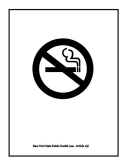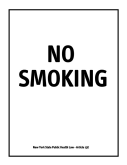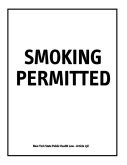Clean Indoor Air Act
Translate this page into other languages:
All business owners and facility managers must comply with New York State Clean Indoor Act requirements identified in Article 13-E of the Public Health Law. Under the New York State Clean Indoor Air Act, smoking and vaping is prohibited in most workplaces, including indoors and on the grounds of public transportation areas, schools, hospitals, restaurants, and bars. Smoking and vaping are not allowed to protect workers and the public from harmful secondhand smoke and vape. The Act defines smoking as burning tobacco, cannabis, or cannabinoid-hemp products.
All facilities with employees must:
- Prohibit smoking and vaping in all businesses with employees
- Inform people that smoking or vaping is not permitted, including posting no smoking signs where employees and the public can see them
- Notify people who are smoking or vaping that they need to move to a location where smoking and vaping are allowed
Click to print signs.



All business owners and facility managers must comply with New York State Clean Indoor Act requirements identified in Article 13-E of the Public Health Law. Under the New York State Clean Indoor Air Act, smoking and vaping is prohibited in most workplaces, including indoors and on the grounds of public transportation areas, schools, hospitals, restaurants, and bars. Smoking and vaping are not allowed to protect workers and the public from harmful secondhand smoke and vape. The Act defines smoking as burning tobacco, cannabis, or cannabinoid-hemp products.
All facilities with employees must:
- Prohibit smoking and vaping in all businesses with employees
- Inform people that smoking or vaping is not permitted, including posting no smoking signs where employees and the public can see them
- Notify people who are smoking or vaping that they need to move to a location where smoking and vaping are allowed
Businesses must also comply with additional local smoking and vaping laws. These must be at least as strict as the Clean Indoor Air Act.
Examples of where smoking and vaping are prohibited:
- All places of employment, including private offices, break rooms, and company vehicles
- Bars and restaurants
- Public indoor swimming pool areas
- All public transportation terminals, including subways and underground subway stations
- Railroad station ticketing, boarding and platform areas operated by the Metropolitan Transportation Authority (MTA) or its subsidiaries
- All occupied transportation vehicles including buses, vans, taxicabs, and limousines
- Public and private schools and school grounds, including within 100 feet of entrances or outdoor areas of public or private elementary or secondary schools, or licensed or registered after-school programs when they are operating
- Youth centers, detention facilities, childcare facilities, child day care centers, group homes for children, public institutions for children, and residential treatment facilities for children
- Within the grounds of any public park (excluding theatrical productions, parking lots, and adjoining sidewalks/pedestrian routes)
- At any public playground outside of New York City during daylight when children under age 12 are present
- Public and private colleges, universities, and educational and vocational institutions
- Hospitals and residential healthcare facilities, including within 15 feet of the entrances to the buildings and grounds
- Commercial establishments used during any trade, profession, vocation or charity event
- Within 100 feet of entrances and outdoor areas of any public or association library
- Indoor arenas
- Zoos
- Bingo facilities
Smoking/vaping may be allowed in:
- Private homes and automobiles
- Hotel or motel rooms rented to one or more guests
- Retail tobacco and vape stores where the primary activity is the sale of tobacco and vape products
- Cigar bars that were open prior to January 1, 2003
- Licensed cannabis dispensaries
- Membership associations where there are no paid employees
- Up to 25% of seating in outdoor dining areas of restaurants with no roof or ceiling enclosure. This area must be at least three feet away from the nonsmoking area. Smoking/vaping and nonsmoking areas must be clearly designated with signs
- Events hosted exclusively to sample tobacco or vape products. A business establishment may only schedule up to two events in a calendar year
More Information
This guidance includes a review of the law's applicability to membership associations, a cigar bar definition, and criteria for use in reviewing waiver applications and issuing waivers. The waiver criteria must be followed by New York State Department of Health enforcement officials. City and county officials may choose to follow some or all of the waiver guidance. New York Cityhas its own laws that prohibit smoking.
Questions?
Email TobaccoEnforcement@health.ny.gov or phone (518) 402-7600.
Get Free Help to Quit
Talk to your health care provider for quit assistance or contact the New York State Quitline toll-free at 1-866-NY-QUITS (1-866-697-8487) or visit www.nysmokefree.com for free information and services in English and Spanish. To enroll in confidential texting programs which include weekly guidance for skill building, text QUITNOW (English) or DéJELO YA NY (Spanish) to 333888, or visit DropTheVape.org.


